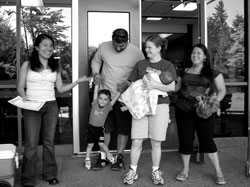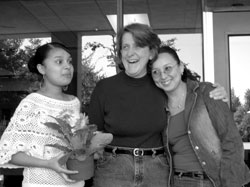CASS looks for host families
Consider for a moment how one might feel thousands of miles from home, in a foreign country, with a strange family, new school and huge language barrier. Also consider the pressure to learn the new language and perform well in college classes to graduate, possibly with Phi Theta Honors. This describes the life of many of the Cooperative Association of States for Scholarships Program (CASS) students at MHCC, made possible in part by caring hosts who offer a home away from home. Host homes are a valuable integrated part of CASS, and it is that time of year for signing up. Hosting a CASS student for the scholars program is a very rewarding opportunity, according to Nikki Gillis, co-coordinator and home-stay manager. “People that host are unique, because they are teachers of culture,” said Gillis. “Host families are the primary support for students in creating a safe and comfortable environment for them to succeed. Building lasting relationships that sometimes extend beyond the campus to the students’ country is not unusual for many of the families,” said Gillis. “Host families and students getting together with all their kids provides for a wonderful community together, motivated by the same desire to contribute to the students’ experience. Their enthusiasm is so genuine in the new experiences that they are contagious. You should see them the first time they go to the Oregon coast and realize our water is not as warm as the Caribbean,” she said. “It is an amazing collaboration of significance in the lives of all involved.”The CASS staff agreed that “by hosting a CASS scholar you are not only enriching the lives of your family and the student you host, but are contributing to the overall development of the Central American region of the world.” According to MHCC employee and CASS host mom Teri Wooley, hosting has been incredibly rewarding for their family. “As to being a host mom, I have nothing but the highest respect for what MHCC’s CASS program offers students from other countries. It is truly a life-changing experience,” said Wooley. “To be involved, I would have to say patience and love, as all moms are already equipped when it comes to having children,” added Wooley. “Some of the most fun activities we have enjoyed together have been great experiences. One that really sticks out in my mind is when we took the kids to Larch Mountain and played in the snow. This was the first time Mauricio had ever seen snow. What an amazing moment to enjoy with him,” said Wooley. Asked about recommending hosting to others, Wooley said, “Goodness, yes. In fact I am now a mother of three, not of just two. Mauricio is loved and appreciated as my other two children. I even said to David [Sussman, CASS coordinator], in the CASS program, that if I had a house with 12 rooms, I would take them all!” She added, “I believed at first this was going to be difficult to get started. However, just search your heart and if you are ready to extend your home, life and love to another child then all it takes is a phone call to the CASS department. I am truly sad to see my son leaving us this June,” added Wooley. According to the program staff, the CASS program has been an integral part of the scholars lives in the last several years, in preparing them to return to their homeland with relevant education for the development needs of each country. CASS prepares students for higher levels of academic achievement and skills training, and broadens the commitment of U.S. educational institutions to disadvantaged foreign youth. This also strengthens the mutual ties of understanding and friendship among the peoples and countries of the Americas. Eighty percent of the students are from rural areas and at least 50 percent of the scholarships are awarded to women. In-country interview committees evaluate scholarship candidates on their academic background, enthusiasm for cross-cultural exchange, eagerness to participate in U.S. community life, leadership potential and commitment to returning home to serve their communities. “It is a win-win for everyone,” according to Sussman.
|

